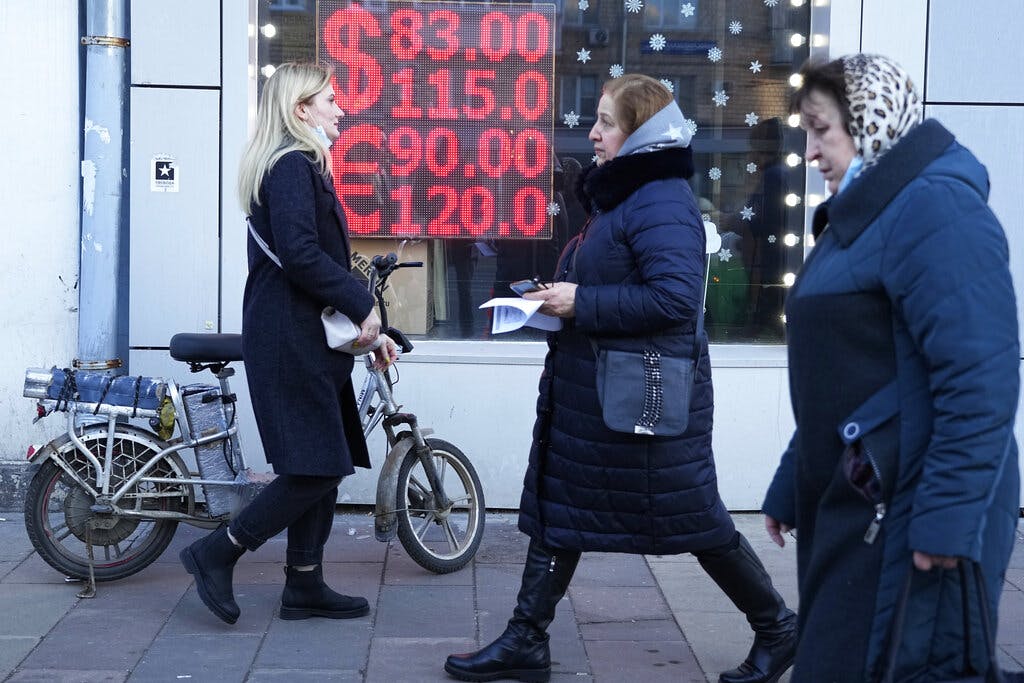Through the Looking Glass Before Russia’s Press Crackdown Fully Takes Hold
A taste of what Moscow residents will no longer be able to read.

ATHENS — Vladimir Putin’s new assault on freedom of the press will not only rob Russians of an accurate picture of the destruction unfolding in Ukraine but also threatens to shatter a window into Moscow’s looming economic death spiral, one that only an independent press can provide.
The government’s harsh new law that will make the intentional spreading of news that doesn’t toe the official line on Ukraine a crime and bans foreign outlets that publish news in Russian comes as the state communications watchdog Roskomnadzor blocked domestic access to Twitter and Facebook, meaning ever tighter controls over the news Russians can see about the invasion.
The bill, signed by President Putin, imposes prison sentences of up to 15 years for anyone who spreads information that contradicts the Russian government narrative. While the Latvia-based website Meduza remains online, it is now virtually impossible to read it inside Russia, which means among other things that Russian readers cannot read an eye-opening piece on the effects that Western sanctions are having on the daily lives of Russians.
In light of a new fiscal reality in which “the ruble exchange rate [has] crashed, several Russian banks have been cut off from SWIFT, and the Central Bank’s foreign exchange reserves are blocked,” Meduza asked readers in Russia to describe how the sanctions — and Moscow’s response measures — have changed their lives. These responses, which could not be independently verified as originating from readers, are among those that Moscow residents will no longer be able to read:
“Because I had invested in Russian stocks I lost my entire savings” Sergey from St. Petersburg said. “Until recently, I didn’t want to leave Russia, but now it seems like there’s no other choice unless you want to live in isolation like North Korea.”
Katya in Moscow said, “I work at a small company — an alcohol importer. Because of the ruble’s instability all deliveries have stopped starting today. Management is silent. I’m going to do the same thing I did before. Work hard, be honest with myself, love my loved ones, and take care of them.”
Writing in the Financial Times, Michael Bernstam of the Hoover Institution at Stanford University said the West’s sanctioning of Russia’s central bank is by far the most effective way to take out the Russian economy, and with $388 billion in Russian assets frozen the rouble is already in freefall, the run on Russian banks in full swing and — in his estimation, the final implosion will be over supply chains. When existing stocks run out at the beverage company where Katya works, there will be nothing left to sell.
Polina in Moscow told Meduza that her Apple Pay account wasn’t accepted at a café, while “the price of olive oil in the shop where I’m used to buying it is up 20 percent, the vacation to Budapest that I planned for May isn’t happening,” and “I’ll be depressed … and cut costs.”
Maria from Moscow said her work, which is connected with international cultural projects, has ceased: “It’s possible that our organization will simply close,” she said, adding that “foreign participants aren’t prepared to come to the Russian Federation. I’m thinking about leaving the country.
Natalia from Stavropol has other things on her mind — like her mind: “My mental health is trashed and I’m rewarded with panic and permanent fear for tomorrow,” she professed, adding, “I’m planning to flee to China.”
Alexander from Novosibirsk said that “anxiety medications are twice as expensive,” adding that they’re Russian-made. Unless you are in Russia right now, you can read more of these accounts here.
In a development not directly related to the press clampdown yet relevant to the economic dire straits of many in Russia, the Moscow Times reports that Russians who have signed petitions against the invasion of Ukraine are now losing their jobs.Of course, accounts of economic hardship in the streets of Moscow pale in comparison to what is happening in Ukraine, where hundreds of thousands of citizens have become refugees almost overnight. A excellent Los Angeles Times account tells how it has taken little more than a week “for Russia’s war to come to Irpin, transforming what was a charming suburb northwest of the Ukrainian capital into an eerie place of cracked windows, mortar-gouged streets, smoke-darkened skies, grief and dread.”

